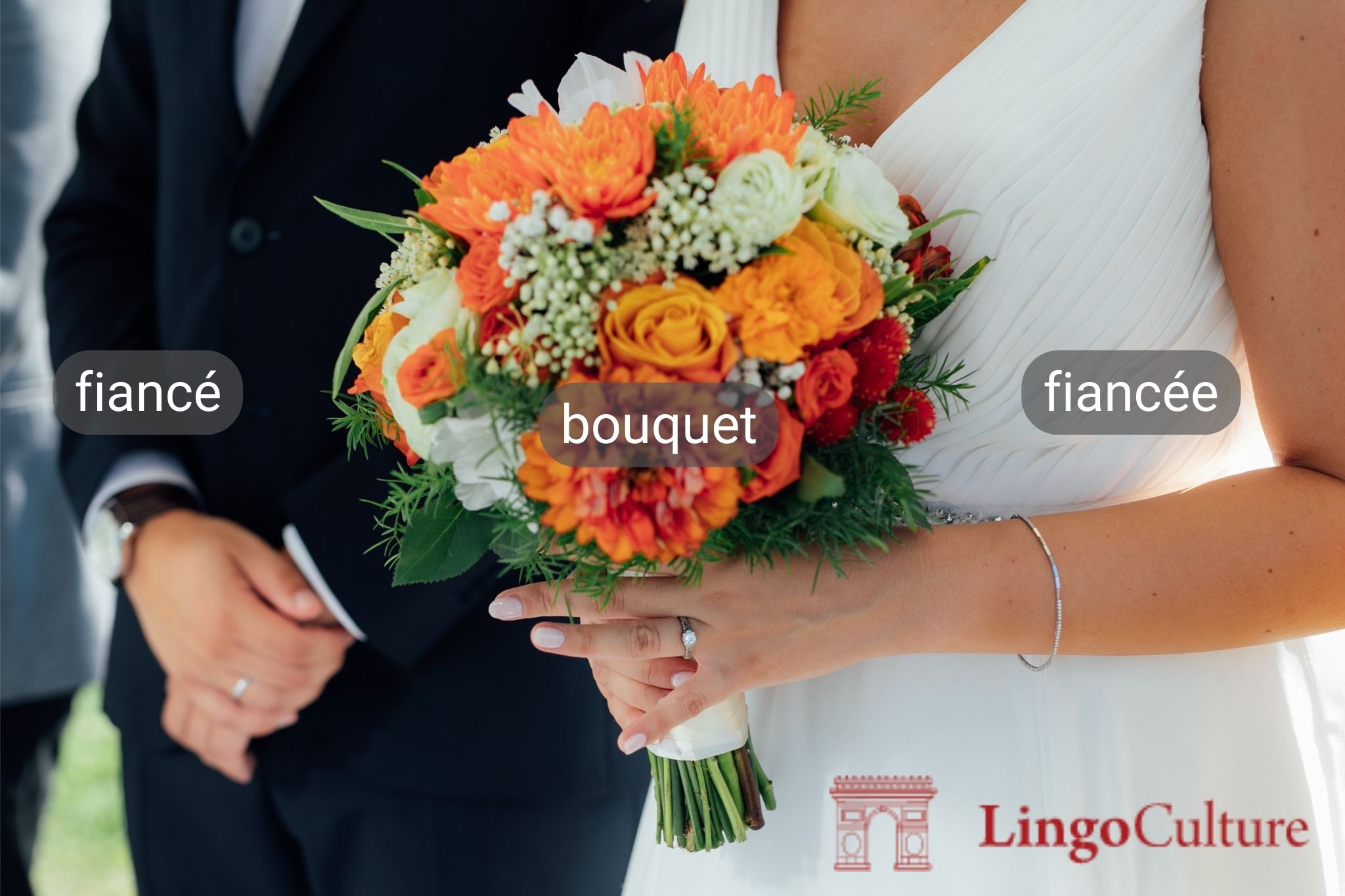French words used in English: 20 familiar words

Get our free email course, Shortcut to Conversational.
Have conversations faster, understand people when they speak fast, and other tested tips to learn faster.
More infoLearning French can be a rewarding experience, especially if you are already proficient in English. In fact, there are a lot of French words used in English, since it’s been used for centuries to give English a certain flair. French words are especially prevalent in the food and fashion industries, for example.
To help you see the common roots of both languages, we compiled this list of 20 common French words used in English.

This post is presented by LingoCulture, the number one way to learn French online.
LingoCulture students get access to unlimited 1-on-1 French classes with 50+ native teachers via video chat for $197/mo. Click here to start your 7-day trial for $1 today.
À la mode
À la mode is a quintessential fashion expression, meaning that something is in style.
- Tight jeans are so à la mode right now. – Les jeans moulants sont tellement à la mode en ce moment.
For some reason, à la mode in English can also be used as a fancy way to say with ice cream. This use does not exist in French!
- I’ll take an apple pie à la mode, please. – Je vais prendre une tarte aux pommes avec de la glace, s’il vous plaît.
Apéritif
While apéritif only refers to alcoholic drinks served before a meal in English, it can refer to both drinks and appetizers in French.
- Would you like an apéritif ? I can offer you Ricard and pretzels. – Voulez-vous un apéritif ? Je peux vous offrir un Ricard et des bretzels.
Blasé
In both languages, blasé is an adjective meaning that someone appears fairly indifferent about something.
- I’m a bit blasé about life. – Je suis un peu blasé de la vie.
Bon vivant
A bon vivant describes someone who enjoys life.
- Paul enjoys good food and wine. He is a true bon vivant. – Paul apprécie la bonne nourriture et du bon vin. C’est un vrai bon vivant.
Bouquet
A bouquet is a quintessential French word used in English, always with its silent t.
- I gave my wife a bouquet of roses. – J’ai donné un bouquet de roses à ma femme.
Bureau
English speakers use bureau to describe a specialized office, usually in officialdom. Its use is much more general in French, meaning simply an office, and also just a desk in French.
- She must drop by the immigration bureau. – Elle doit faire un saut au bureau d’immigration.
- I forgot my phone on my desk at the office. – J’ai oublié mon téléphone sur mon bureau au bureau.
Chef
In French, un chef can refer both to a professional cook and a boss.
- The chef made us an amazing dessert. – Le chef nous a fait un dessert impressionnant.
- Our boss loves endless meetings. – Notre chef aime les réunions interminables.
Cliché
In both English and French, a cliché is similar to a stereotype. This use can be either an adjective or a noun in both languages. As a noun, un cliché in French can also refer to a photograph.
- This movie is so cliché. – Ce film est tellement cliché.
- I took a nice photo of the old bridge. – J’ai pris un beau cliché du vieux pont.
Cul-de-sac
In both languages, a cul-de-sac refers to dead end, usually of a road or path. The literal translation of cul in French is butt or ass, so un cul-de-sac is literally a bag’s butt end. While in English this usually refers to an end-of-road layout that’s rounded to facilitate turning around, in French we use cul-de-sac for the end of a dead-end road of any shape.
Note that in French the l in cul is silent, whereas in English it’s pronounced the same as cull.
- This road ends in a cul-de-sac. – Cette route finit en cul-de-sac.
Début
While English speakers use début for someone’s first public performance, the main meaning in French is beginning.
- The young artist made his début last year. – Le jeune artiste a fait ses débuts l’année dernière.
- I started my new job at the beginning of the year. – J’ai commencé mon nouveau travail en début d’année.
En route
This is a great expression meaning that someone or something is on their way.
- My package is en route to France. – Mon colis est en route pour la France.
Entrepreneur
Entrepreneur is derived from the French verb entreprendre, which means to undertake. In both languages, it refers to someone who starts a new business.
In French, un entrepreneur is also commonly used on its own to refer to a contractor in the building trades, though it’s often accompanied by a description of the person’s specialty.
- With so many regulations, it is difficult to be an entrepreneur nowadays. – Avec autant de réglementations, c’est difficile d’être un entrepreneur de nos jours.
- I hired a plumbing contractor to redo our bathroom. – J’ai engagé un entrepreneur en plomberie pour refaire notre salle de bains.
Fiancé, Fiancée
In French, the verb to become engaged to be married is se fiancer. Following les fiancailles, or the engagement, the engaged man is known as le fiancé, and the engaged woman is la fiancée.
Both of these titles for the engaged individuals have been adopted into English with the same pronunciation and the same accented é.
- Let me introduce you to my fiancé Simon. – Laissez-moi vous présenter mon fiancé Simon.
- Lovely to finally meet you, Simon. I’ve known your fiancée Adèle since university. – Ravie de vous rencontrer enfin, Simon. Je connais ta fiancée Adèle depuis l’université.
Gauche
In both English and French, gauche is an adjective meaning awkward or clumsy. It can also translate to left in French.
- She is a bit gauche sometimes, but we still invite her out. – Elle est un peu gauche parfois, mais nous l’invitons quand même à sortir.
- Sometimes I feel like I have two left hands. – Parfois, j’ai l’impression d’avoir deux mains gauches.
Queue
When you need to wait in line for something, the line is called a queue in both English and French. Another word for this waiting line in French is une file d’attente.
In English a queue is also a type of list where things are processed in order, like when you add songs to a playlist.
The main meaning of queue in French is actually a tail, whether of an animal or of something else like a plane or a parade. Be careful of context when you use this word in Canada, because in québécois French, une queue is also a slang term for a penis or a dick.
Although queue is written identically in both French and English, the pronunciation is different. In English queue is pronounced the same as the English word cue, while in French it’s pronounced the same as the French word que.
- I spent almost one hour in the queue ! – J’ai passé presque une heure dans la queue !
- I’ll add your song to my queue and play it after the others. – Je vais ajouter votre chanson à ma file d’attente et la jouer après les autres.
- The beaver has a big flat tail. – Le castor a une grosse queue plate.
Restaurant
Did you know that un restaurant is a French word? In French we often even shorten it to un resto.
- La Tour d’Argent is a very famous restaurant. – La Tour d’Argent est un restaurant très connu.
Sauté
Sauté comes from the French verb sauter, meaning to jump. In both languages, sauté can be used as either a noun or a verb to describe cooking morsels of food in a pan, though if it’s used as a verb in French it may take a different form.
- I like to sauté my vegetables. – J’aime bien faire sauter mes légumes.
- My mom prepared a delicious chicken sauté for dinner. – Ma mère a préparé un délicieux sauté de poulet pour le dîner.
Soirée
A soirée is a casual party, usually with a touch of class.
- We are invited to a fancy soirée tomorrow night. – Nous sommes invités à une soirée chic demain soir.
Tête-à-Tête
A tête-à-tête is private meeting between two people. Its literal translation in French is head-to-head.
- My boss requested a tête-à-tête with me. – Mon patron m’a demandé que l’on se voit en tête-à-tête.
Voilà
Voilà is an expression of accomplishment similar to there it is! or ta-da!
- You add the fruits and voilà, your cake is ready! – Vous ajoutez les fruits et voilà, votre gâteau est prêt !
Conclusion
It is remarkable to observe how many French words have been adopted into English. These French-rooted words are employed in both languages with regularity, illustrating just how deeply intertwined these two languages are.
We only listed 20 today, but there are actually hundreds of them. If you want even more, you can take a look at our other LingoCulture post on French words used in English.


